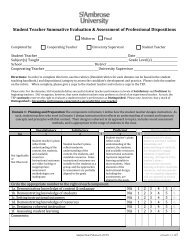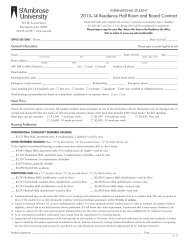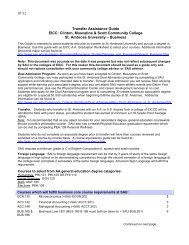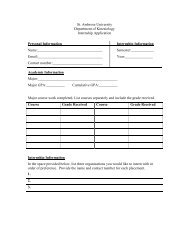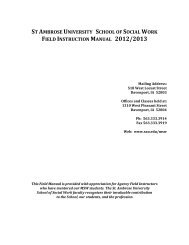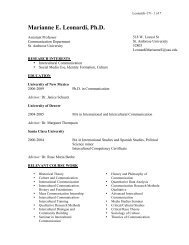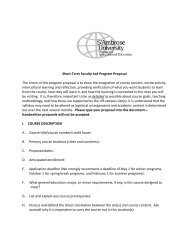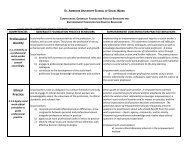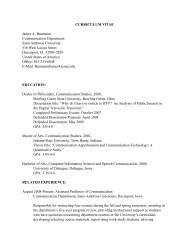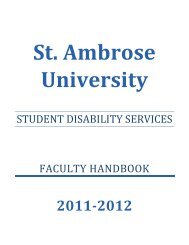St. Ambrose University 518 West Locust Davenport Iowa 52803 admit
St. Ambrose University 518 West Locust Davenport Iowa 52803 admit
St. Ambrose University 518 West Locust Davenport Iowa 52803 admit
Create successful ePaper yourself
Turn your PDF publications into a flip-book with our unique Google optimized e-Paper software.
Graduate Curricula<br />
<strong>St</strong>udents must remove themselves from academic<br />
probation within their next two semesters. For<br />
each C grade earned, there must be an offsetting<br />
A grade. Only two C grades are permitted in the<br />
graduate program. A third C grade or an F grade<br />
results in academic dismissal from the program.<br />
Any student dismissed from the MBAH program<br />
due to academic deficiency can reapply after a<br />
minimum of one elapsed semester. (Refer also to<br />
grading policies and grade point determination).<br />
Curriculum Requirements for the Master of<br />
Business Administration in Health Care Degree:<br />
Foundation Courses (9 semester credits): MBA<br />
506, 507; MBAH 527; Core Courses (36 semester<br />
credits): MBA 505, 621, 626, 635, 670, 675,<br />
680, 685, 690, MBAH 756, 799, MBA 800;<br />
Executive Courses (12 semester credits): Choose<br />
four of the following: MBAH 636, 681, 686,<br />
706, MBA 715, MBAH 758, 805.<br />
Course Descriptions<br />
MBAH 527. Economic Analysis in Health Care<br />
Management<br />
3 credits<br />
Evaluates reimbursement strategies, social and<br />
political factors that affect the usage of health<br />
facilities and the payments of services, and<br />
changes in patterns of use of health care<br />
providers. Budgeting and financial management<br />
are considered in relation to these issues. Trends<br />
in business forecasting that influence both nonprofit<br />
and for-profit organizations are studied.<br />
MBAH 636. Legal Issues in Health Care 3 credits<br />
Acquaints the health care student with the internal<br />
and external legal environment faced by a<br />
health care provider and its manager. This course<br />
will look at malpractice, risk management, tort<br />
law and tort reform, OSHA regulations, construction<br />
organizational charters, bylaws, rules<br />
and regulations, legal constraints on organizational<br />
management, laws affecting subsidiary corporations,<br />
internal and external legal environmental<br />
for health care provider, tax law, human<br />
resource laws and regulations in hiring/firing, and<br />
benefit/retirement trust management.<br />
MBAH 681. <strong>St</strong>rategic Marketing<br />
in Health Care<br />
3 credits<br />
Builds upon the principles which were learned by<br />
the student in the basic MBA Marketing<br />
Management course. Health care organizations<br />
and integrated delivery systems face challenges<br />
from marketing in the health care field because of<br />
traditional and historical biases which relate to<br />
this industry. The use of advertising and promotion<br />
has been taboo in the health care field, particularly<br />
as relates to non-for-profit organizations<br />
and physicians in medical practice. Prerequisites:<br />
MBA 635, 680, MBAH 527.<br />
MBAH 686. Health Care Professional<br />
Management Issues<br />
3 credits<br />
Addresses issues related to health care professionals<br />
and their interrelationships with other physicians,<br />
health care administrators, therapists, nurses,<br />
and patients. The course should look at medical<br />
staff structure and functions, health care professionals<br />
in administrative positions, as salaried<br />
employees, and as leaders in health care organizations.<br />
Prerequisites: MBA 621, 685, 635.<br />
MBAH 706. Quality Management in<br />
Health Care<br />
3 credits<br />
Quality of patient care has always been a primary<br />
concern in health care delivery. Historically,<br />
quality has been judged by experts in the field.<br />
However, with the introduction of computers<br />
and modern statistical analysis, quality evaluation<br />
currently depends heavily on the collection<br />
and manipulation of data. Improvement of quality<br />
is evolving into system analysis and total quality<br />
management. Health care managers must be<br />
familiar with modern techniques of quality<br />
improvement. The distinction between quality as<br />
measured by the health professional and quality<br />
as measured by industry will be analyzed. Case<br />
studies and real-live examples will be used.<br />
Prerequisites: MBA 505, 621 MBAH 756.<br />
179




